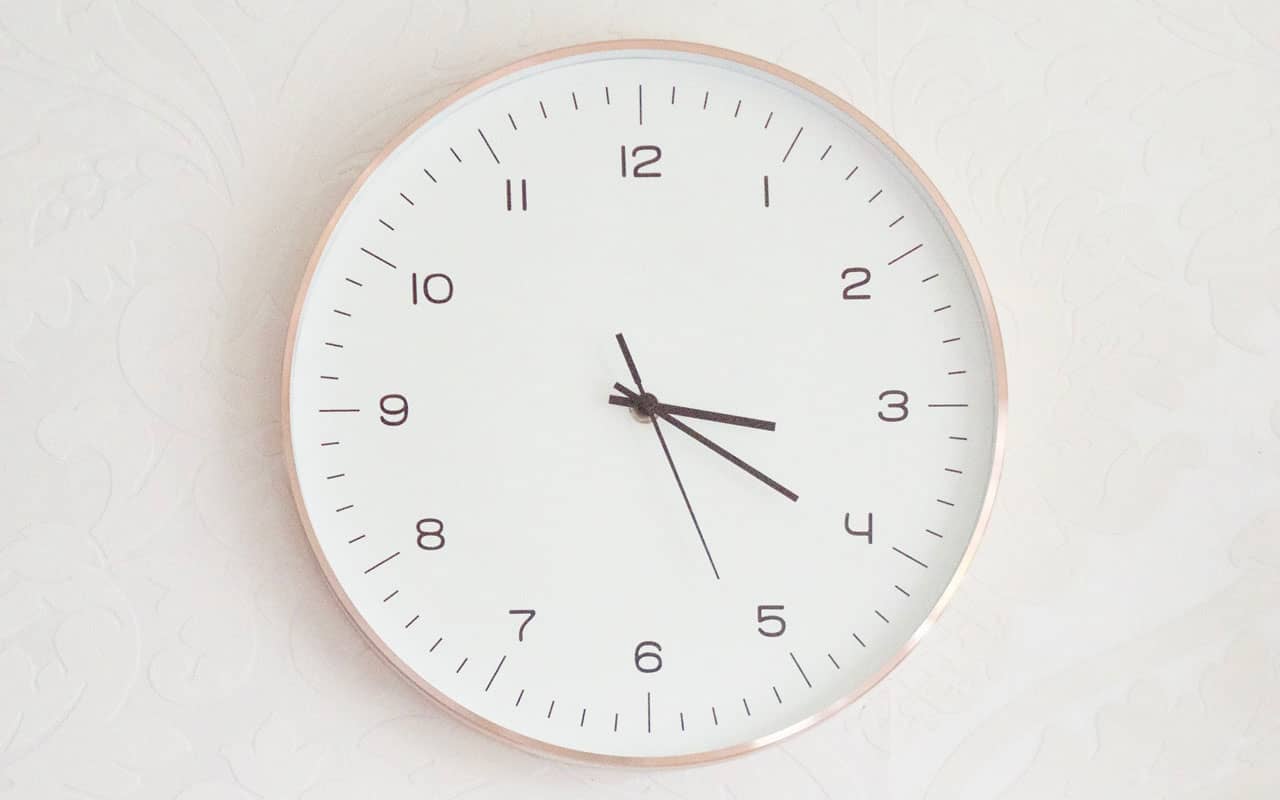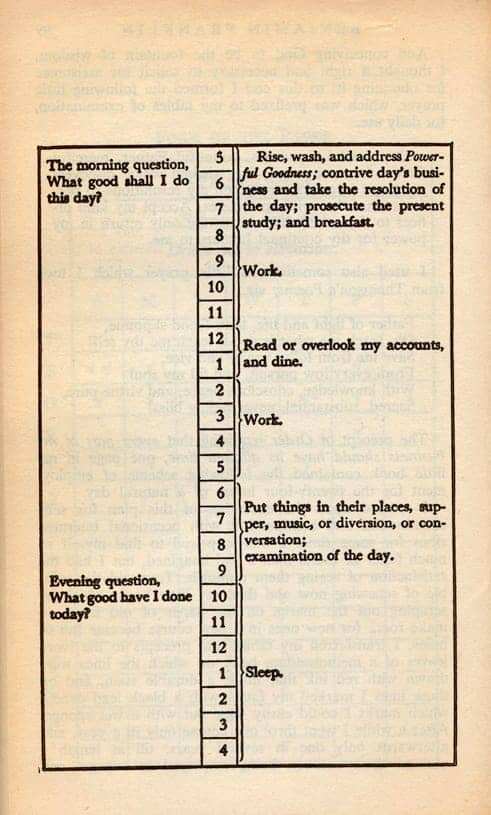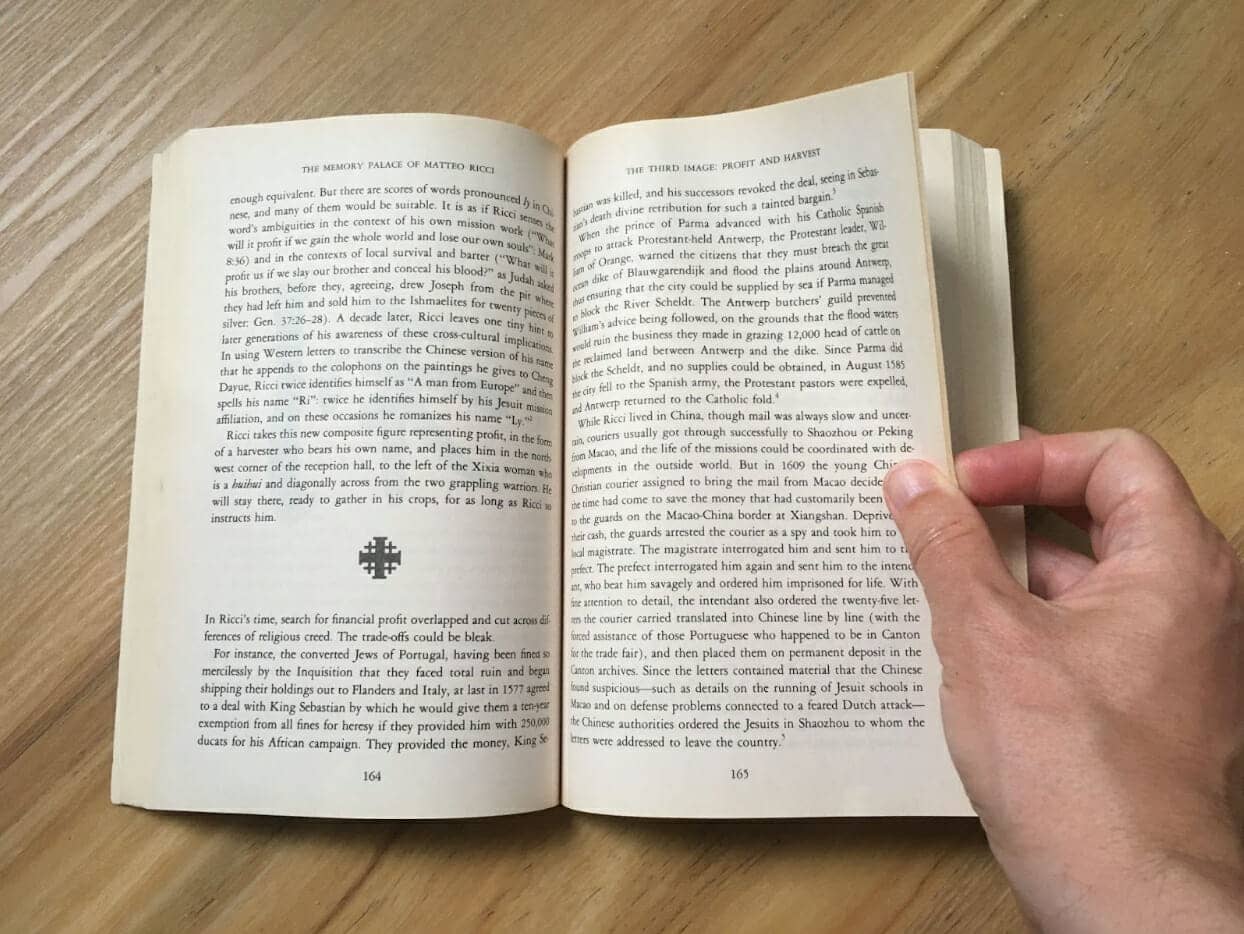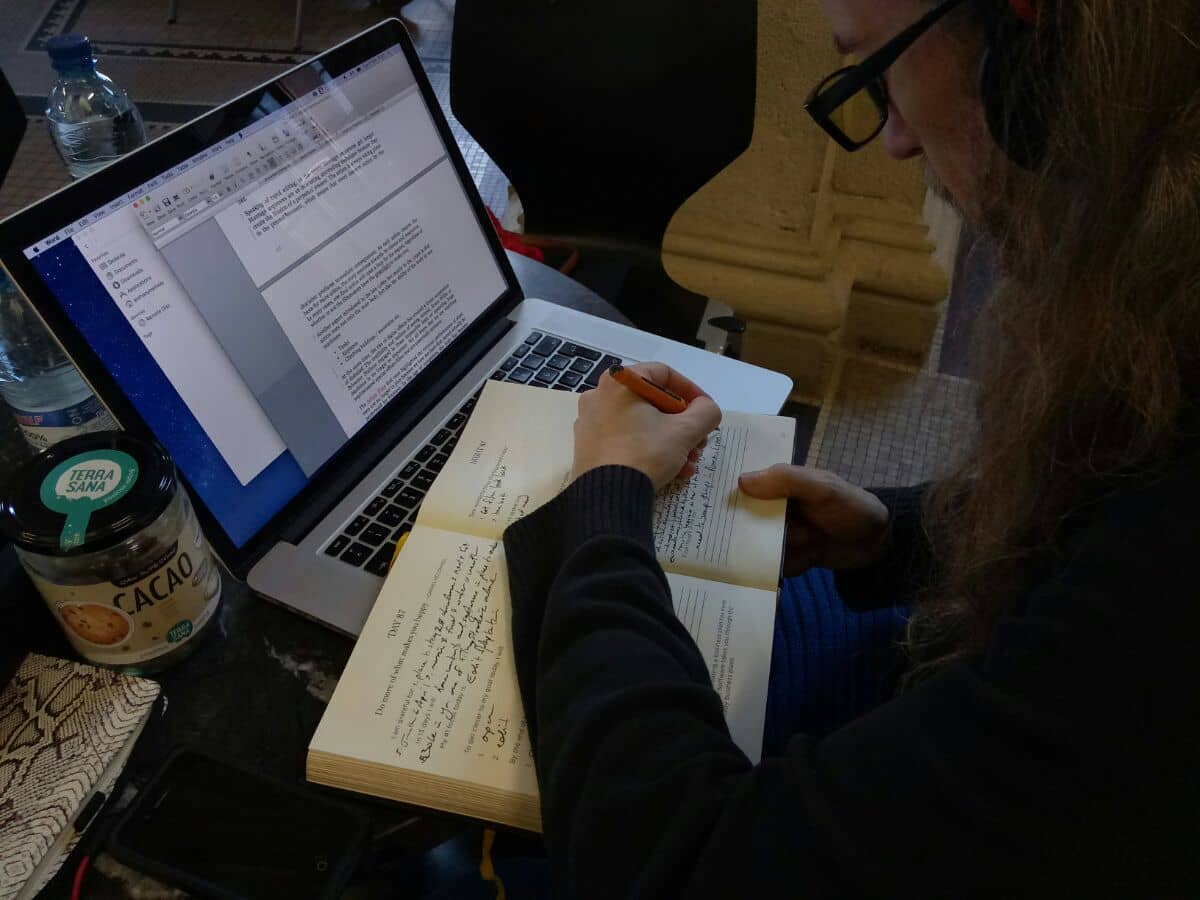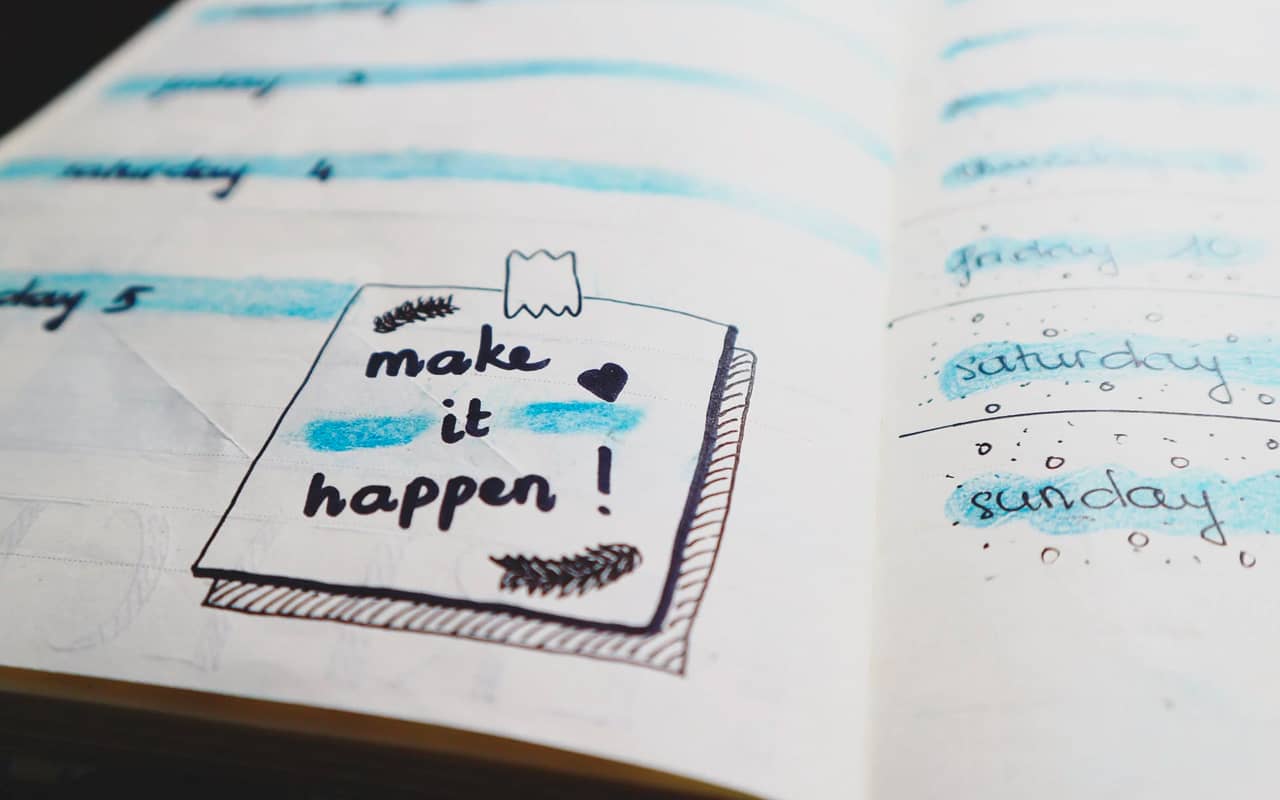Podcast: Download
Subscribe: Apple Podcasts | RSS
 I didn’t learn the most productive study habits overnight.
I didn’t learn the most productive study habits overnight.
But I learned just how terribly ineffective cramming can be when I failed an exam during my undergrad.
I swore I would never never fail like that again and committed myself to mastering the skills involved in studying like a pro.
Sure, I normally practiced good study habits.
But I made it my mission to discover and use the best study habits possible.
After earning my BA, two MAs and a PhD, I have built one of the biggest memory improvement websites online.
In order to provide the best possible information week after week, I still need to use the same learning techniques.
Today, I’m going to share them with you.
So if you’re a serious student who wants to use everything from traditional methods to AI as you ace all your exams, get ready for detailed tour of how the top achievers learn.
All I ask is that you leave cramming at the door. It’s too risky and doesn’t lead to long term retention even if you can get away with it once in awhile. You deserve better.
8 Productive Study Habits To Excel In Academics
As we go through these habits, keep the term “habit” in mind. I really do mean long-term habits that involve deliberate practice.
A lot of people try a technique once or twice and then decide it doesn’t work.
Frankly, sometimes they are right. Not all techniques are for everyone.
But trying something for a day or two isn’t fair or honest. I suggest you commit to the study habits you choose for at least 90-days.
There are some studies that say 66 days is enough. Other studies have shown a slightly shorter commitment.
I suggest you keep these in mind and go a bit longer than any study suggests just to be sure. Myself, I love to use The Freedom Journal because it helps guide you through 100 days. It has helped me accomplish many goals and literally rewired my brain to be more productive.
Now, with that success tip in mind, let’s get started with the habits I suggest you explore.
One: Time Blocking
Not having enough time is one of the biggest problems learners face. Fortunately, it’s easy to solve.
For example, Benjamin Franklin used time blocking. He literally visualized his day as vertical row of hours.
When I was in university, I blocked time in a similar way. I had various jobs and wrote all of my work hours out. Then I assigned exactly when I was going to study.
I even wrote out what I was going study while commuting and stuck to the schedule.
Later, when I taught as a professor at Rutgers, I used the same scheduling system habitually. I was still finishing my PhD and wrote out that I would grade papers on the train in and read specific books on the way home. As a result, I was able to get my dissertation written ahead of schedule and did well on all of my exams.
Two: Study Habitually In Specific Places
Studying while commuting is not ideal. That’s why I also make sure I have specific places I study.
Back when I was doing my degrees in Toronto, I had a network of libraries at both York University and Toronto mapped out. I knew exactly which were the best study places for me, and avoided having to read during times of high noise and human traffic.
As a professional, I still have a list of productive study places. My favorite floors in the best libraries are all worked out and I can selectively show up to study during what I’ve found to be the quietest hours.
It takes a bit of discipline, but is well worth it. Plus, if something’s going on and you can’t get the quiet you need, by having a list of alternative places ready to go, you’ll be able to relocate and stick to your basic schedule.
Three: Have A Variety Of Note-Taking Methods
Although it would be nice to have a single note-taking strategy for all kinds of different information, that simply isn’t realistic.
I’ve used everything from standard notebooks to recording with a micro-cassette recorder and mind mapping.
When it comes to memorizing from textbooks, my favorite note-taking technique is called the Zettelkasten method. It’s highly adaptable and works well in conjunction with the Leitner System for developing memories faster.
Four: Take Breaks Like A Pro
We all know that taking breaks is essential. However, some ways to getting in a bit of rest are better than others.
For example, there’s a science-backed learning technique called interleaving. Merely by switching strategically between topics, you get a memory and retention benefit.
Taking a quick walk (or even a long one) can also refresh your mind. What you want to avoid is looking at your phone and falling down an Internet rabbit hole.
Scientists have generally found that going online provides a net negative for learners. Your dopamine can get messed up, and unlike switching between books or taking a walk, digital amnesia can cause you to lose track of time.
I’m not suggesting you shouldn’t ever go online. Rather, the best possible study habit would be to use time blocking so that when you go online is strategically placed during your day. That way, you’ll be able to afford wherever surfing through links takes you.
Five: Use the Pomodoro Technique With Caution
Some learning experts like Barbara Oakley swear by the Pomodoro Technique, which is kind of like technology-assisted time blocking. You use a timer to study in 15-minute intervals.
Certainly, using a timer works for many people. But there are two reasons I’ve used it only as a last attempt method during those rare moments when my mental clarity is challenged for whatever reason.
First, I like to be in flow when I study. If even a shred of my focus is directed at a timer about to chime, I can’t fully get into what I’m studying. If I’m able to get into flow, the timer then startles me at the precise moment I’m finally into my studies. That leads to stress, which can negatively impact memory.
Second, I teach all of my students in the Magnetic Memory Method Masterclass to train themselves to take natural breaks using interleaving as we’ve discussed above.
That way, you don’t wind up looking at your phone all the time. There are better ways to control how long you study, such as the “pinch technique” I teach in my article about how much to read in any given session.
In sum, Pomodoro can be good for targeted learning goals. But for bigger projects, it can become a time-wasting habit that not only fails to serve you. It can have the opposite effect and harm your ability to recall information.
Six: Eliminate Distractions
I have a little ritual before I sit down to study anything. It only takes a second and makes all the difference in the world. It goes like this:
- Clear the table of anything non-essential
- Turn off the Internet and phone
- Have only my study materials within reach
- Have all my flash cards and writing materials ready to go
I suggest you come up with a similar ritual and make it a habit.
You can also make sure others know your schedule so they are able to avoid being a distraction as well.
Seven: Reduce Multitasking
Getting rid of multitasking entirely is a bit tricky. Many topics are interwoven and sometimes you need to take different kinds of notes at the same time.
Eliminating distractions as discussed above will help make sure you’re not trying to read a book while also looking things up.
But it will be tempting to search for references and even vocabulary you’re not already familiar with, and this is a battle that never goes away. Especially not if you want to be a polymath one day.
That’s why I suggest you keep one notebook you use exclusively for taking note of ideas and vocabulary you don’t recognize later.
I learned this from a professor I had years ago. He called it keeping a “not now folder.” He literally suggested writing every research task on a separate slip of paper and placing it in this folder. Many print journals come with an envelop in the back like this that you can use as part of this strategy. Or you can just keep note of items to look up later in a top-down list in any kind of notebook.
Either way, this approach helps you focus specifically on reading. Later, you then can bring a high quality of focus strictly to research as its own task. This is brilliant advice and circles us back to the principle of time blocking.
Dealing with things you need to look up later rather than multitasking as you try to study will also give you a form of spaced repetition. Let’s discuss that study habit next in more detail.
Eight: Use Spaced Repetition Strategically
Spaced repetition is a science-backed revision process where you revisit information over time. It’s a strong alternative to rote learning.
You can use it in a variety of ways, including a special software called Anki. You just have to be careful that you time block using this software in order to avoid traveling all over the Internet when you’re supposed to be reviewing information you want to learn.
Luckily, there are alternatives to software. One of my favorite is the Memory Palace technique. It lets you revisit information purely in your mind.
Even better, it helps you avoid what memory scientists called the forgetting curve. You will remember more over the long term thanks to having a strategic study habit designed to make sure the things you study stick in your mind.
3 Common Study Habit Mistakes That Kill Productivity
Over my many years as a student, I learned the hard way what works and what doesn’t.
Let me give you a list of the worst habits I’ve seen, both in myself as a student who used to struggle. And I’ll share some of the habits I’ve seen as a professor.
For each common mistake, I’ll share the best possible solution so you can develop much better habits that lead to academic excellence.
Poisoning Your Brain And Body
It’s hard for me to believe this now, but as an undergrad, I often went to a 24 hour grocery store in the middle of the night for ice cream.
That’s after having eaten pizza during the day and barely drinking enough water.
Even though the metabolism of young people creates the illusion of being able to handle it, memory loss starts at a young age. Some scientists believe it can even begin in your 20s.
The point is that you can start eating memory-friendly foods at any time. If nothing else, be sure to avoid foods that harm your brain.
Don’t Overload Yourself
It’s easy to take on more than you can handle. I know because I was once in a hurry to complete my first degree faster. I want up falling apart completely.
Only later did I learn to slow down, and even read slower when I needed to do so for comprehension purposes.
At one point, I even asked Professor Derek Cohen for an alternative assignment just so I could bring a higher quality of attention to the work. He agreed and I wound up passing his course with an A+.
One reason people overwhelm themselves instead of exploring alternatives is that they simply don’t know that schools are usually more flexible than they seem. Make sure to communicate with your instructors when you’re having issues and most will help you adjust.
When you meet a stubborn professor who won’t, you can always contact the department secretary to find out who to speak to for help. Point being: you don’t have to suffer overload.
Avoid Leaving Assignments To The Last Minute
Part of the function of going to school is to prove that you’re competitive. Companies want to hire people who can help them succeed in the market. That means they need employees who can help them deliver on time.
For this reason, university is a great place to practice delivering assignments not just on the date they’re due. You can also practice completing your assignments ahead of time.
This strategy will accomplish a few things for you:
- You’ll have less stress around deadlines
- It frees up more time for study
- You can do additional research and revision of written assignments
- You’ll have more time for extra-curricular activities
Once I got into getting my assignments done as early as possible, entire new worlds opened up for me. At one point, I even started up a small press with my friend, Rob Read. I also was able to do a bit of work in the film industry, perform at a variety of cultural events and write a couple of books.
None of that would have been possible if I was leaving my assignments for the last minute. I wouldn’t have been able to handle the stress.
How To Create An Effective Study Habit Plan
Creating a plan is fairly easy.
I suggest you start with a vision statement. I’ve created an epic video training showing you exactly how to do this for better learning outcomes. My book, The Victorious Mind, includes an example from one of my readers who used that training to help himself succeed much better as a student.
Once you’ve created your vision for success, you just need to write out:
- What you’re going to study
- When you’ll study
- Where you’ll study
- Who you will reach out to if you need help
I also suggest you include all of your exam dates and assignment due dates so you can see them at a glance. This will help you “reverse engineer” how many study sessions you’ll need.
You don’t have to get this perfect the first time you give it a try. I just suggest you get started practicing this approach sooner than later. Creating your own study plan is a habit-based skill unto itself and deserves the effort.
How To Make Technology Your Ally For Studying
These days, it’s easy to ask an Artificial Intelligence for help.
The problem is, even if chatGPT for language learning can be pretty good, it has a lot of accuracy issues. It will also sometimes hide certain perspectives that are essential to know about if you’re going to be a critical thinker.
To get the most out of these technologies, I suggest you include them in your vision statement and study plan. Do you want to be a pro at using Artificial Intelligence for research? Then book the time to figure out how to do it well.
Put it this way: If you’re using these softwares to write for you, you’re doing it wrong. As Julian Peterson, founder of Essay puts it, you need to be able to write for yourself if you want to be competitive in today’s world. It’s about being able to think clearly as much as it is about cranking out original writing.
In terms of other technologies, you can certainly use airplane mode during study hours. But why not just put your phone in a separate room? It’s good to spend time away from your devices anyway. I call the habit of spending time away from my devices so I can get serious reading done “digital fasting.”
As a result, I read much more, remember it and enjoy a much more productive mind.
If you’d like more mental strength yourself, please sign up for my free memory improvement course:
It will help you through free video lessons and worksheets develop your memory skills and reduce lack of concentration issues. As a result, you’ll enjoy an instant boost in how much you remember from your study sessions. You’ll also stop losing your train of thought when sitting for exams.
Plus, you’ll develop your procedural memory and many of these habits will just start happening more automatically.
That’s a beautiful thing because that’s what a habit is: Something you do with minimum effort to enjoy maximum benefits.
So what do you say?
Let’s get studying!
Related Posts
- Stoic Secrets For Using Memory Techniques With Language Learning
Christopher Huff shares his Stoic secrets for using memory techniques when learning a language. You'll…
- The German Professor Who Defends Memory Techniques for Language Learning
This professor defends memorization techniques for learning foreign languages and has the science to prove…
- The Memory Journal For Competition and Developing Mnemonic Systems For Learning With Johannes Mallow
Johannes Mallow shares details on how he used a Memory Journal to massively improve his…

